Amaka Odunze arrived Canada in 2021. She was thirty-two weeks pregnant and migrated with her husband and two children. She describes her migration experience as transformative, saying it is the boldest, riskiest and most adventurous thing she has done. At the time she came in, there was a backlog in the healthcare system due to the post-pandemic activities, so it took her three weeks to get her health card, during which time she didn’t have access to a doctor. As her due date arrived, there was still no access to a doctor due to the dearth of medical personnel, so she resorted to midwives. Amaka tells her full story here:
Upon our arrival in Canada, we had our accommodation settled for us. My brother, who was unmarried at the time, had acquired his own house and was living alone; he looked forward to me and my family coming to live with him and keep him company. It was like a homecoming, and we settled in quite well. I had taken an extended maternity leave from my job in Nigeria for six months, so I had ample time to recover well before I had to start looking for a job. Also, because I was a senior executive at my place of work, an additional three months was required as resignation notice, which I gave at the end of the six months of maternity leave.
As my due date drew closer, I still did not have access to a medical doctor, and I began to panic. Luckily, I had friends living in Toronto who had given birth here, and they advised that I might have to consider the option of using midwives. This was strange terrain for me because I had used gynaecologists and medical personnel in Nigeria and the US for my prior deliveries. I had never had to use midwives before, but with my due date near, I didn’t have much of a choice. I registered with the midwives and had them examine me; upon observation, I was told that my pregnancy was high risk as I was diagnosed with gestational diabetes. The midwives placed me on close observation and said if there were any signs of a complication, I would see a doctor and maybe have a CS. Thankfully, I didn’t need the emergency CS as I had a smooth delivery and gave birth to a beautiful baby. This experience opened my eyes to the blessings of midwives. They offered me such wonderful and personalized care and support; they were with me up until six weeks after I had my baby. The postpartum care was just wonderful; they checked up on me almost daily and checked on my breastfeeding to ensure I and the baby were fine. I don’t think I would have got this level of personalized care if I had used a family doctor, and I am so grateful for the midwives. The only downside about this whole experience was when, after I had delivered my baby and was taken out of the labour room, I asked to be placed in a room alone. However, I was told that the only one-person rooms were reserved for COVID patients and that I might have to share a room with six other women who had just had their babies. Thankfully, a space opened up at the last minute, and I got to share a room with just one lady, having paid extra for this.
After having my baby and recovering well, I took my time to observe the labour market and strategize my entry. I landed my first job in 2022, which opened my eyes to the work culture in Canada. I have worked in a professional capacity for fifteen years, and while I can be goofy and friendly, when it comes to the work environment, I like to keep it strictly professional. This is why I was a bit discomfited with the culture of small talk in the workplace in Canada. While I appreciate that small talk can be an icebreaker, some people overshare everything about their lives or families. Sometimes, people you have never met before at church or other gatherings tell you deep personal things about themselves and their past as a way to connect with you and unburden as well. Also, when we gather for meetings, it is quite surprising how we can spend about fifteen minutes talking about things outside the agenda for the meeting, and I can’t help but think that this is company time being spent on small talk. At first, I struggled with this, but in time, I realized I was the only one always waiting for the small talk to end before speaking, and then I began to ease myself into the practice and culture of small talk. Now I realize that more than being an ice breaker, it humanizes our experiences where we can appreciate that we don’t all have it together, and we can give a listening ear to offer empathy and comfort to someone who needs to share.
Looking back, I would have been better prepared for my job entry strategy. I would have researched the labour market and familiarized myself with the process of landing a job in an industry well suited to my skill set. I was told that I might have to start an entry-level position in Canada, which I didn’t agree with, so I bagged some additional professional certifications to be more attractive before coming to Canada but that was not enough. I could also have networked with Canadian industry experts using Linkedin and engaged with them, asking them to refer me for roles within their network.
My greatest advice to new migrants, especially women of colour, is to have an action plan. This is pertinent in landing jobs you desire; you set a goal and walk backwards to your current state, earmarking all the salient points to help you achieve this. Volunteer experiences, overshadowing industry experts even in your home country and learning new skills will make you attractive to recruitment managers here in Canada. You don’t have to come to Canada before you begin planning for your life here. My second advice is to surround yourself with positive people who have your best interests at heart. Sometimes, the right people may not give you the best advice because they unconsciously project their experiences, pain and disappointment to you. Surround yourself with people who will inspire you and push you to be better. Again, having a spouse who shares your vision and encourages you to improve daily is also an advantage. When my husband returned, we were able to support each other so that we had equal chances to chase our dreams.
Some friends gave me advice that would have limited me, but I cut them off and embraced those who pushed me to believe in myself and take giant strides. Despite the several rejection letters from jobs I had applied for, I have a small circle of friends who encouraged me and reminded me of my worth. Anyone or circumstance that makes you feel like you have to make yourself small to fit in should be cut off. You don’t belong there, and that person does not belong in your circle. You have to be really intentional about who you listen to, what advice you take and who you surround yourself with. You have to do the work and have a strategic plan because the hidden job market accounts for 85% of all the jobs while it is the 15% of available jobs we see advertised on LinkedIn and other job boards.
Be prepared to challenge the norms and question stereotypes. In life, you are the master of your fate, and you can demand from life what you want. You must be patient with the process, be patient with yourself, be resilient and determined, and have an unshakable faith in God.
Amaka tells her story from Toronto, Ontario.


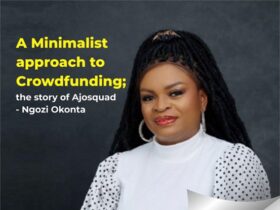
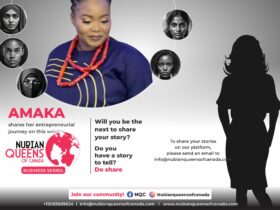
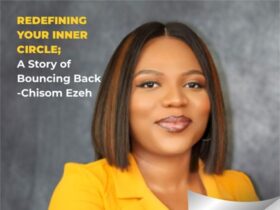

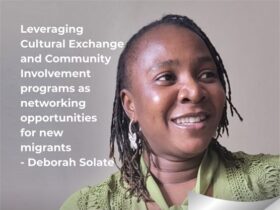
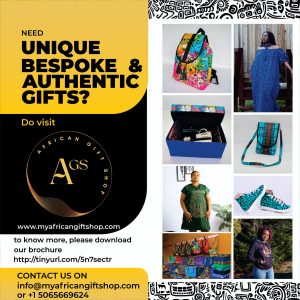






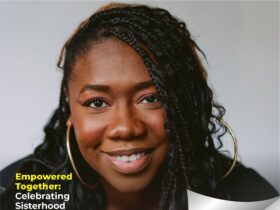

Leave a Reply